What Was In Plain Sight…
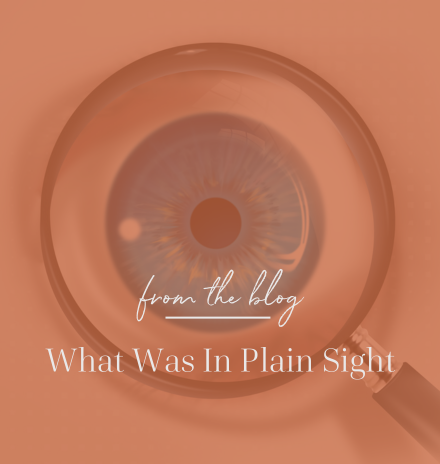
Years ago (nine to be specific) I was on Oprah. That may sound glamorous, but I was not on Oprah for the reason someone like me would dream of being on Oprah. It was when my oldest daughter was 10 years old.
There was a popular conscious parent coach named Dr. Shaefali who was looking for kids to interview about relationships with their parents for a two-part series. Clips from the conversation would be used during the live show with Oprah and the kids’ parents in the audience.
My daughter was one of the kids interviewed.
When my husband and I arrived with the rest of the audience on the day of the live taping with Oprah and Shefali, the producers took my husband and me aside to ask if we were willing to be mic’d up. That was when I heard a producer’s radio, “Please seat the Hylands in the front row.”
Oh no. I hadn’t planned on this. I started to sweat. My husband whispered reassuringly, “I never thought this was a good idea.”
When the lights went on and the show began, my daughter’s face appeared on a two-story screen. Dr. Shefali asked the group of children, “If there were a couple of things you could tell your parents about how to be a better parent, what would you want them to know?”
My daughter’s response: “Sometimes when I feel pressure and I talk to my mom about it, I don’t really need her to always go into a working mode of how you can solve things and fix things, sometimes I just need — this next word comes out slowly — a hug.”
Either a mic dropped or my heart did.
At that point, the camera shot over to my husband and me in our seats. Oprah turned toward us announcing, “We have Casselry’s parents with us in the studio audience today.”
Oprah directed the next question to me: “When you hear what your daughter has to say, are you surprised?”
In part, I was stunned. The other part of me was not. At that moment, I realized how often I was running around trying to function — get things done, raise three young kids, meet the demands of work — so much that I wasn’t aware of how I was listening or speaking to my daughter and what she truly wanted in these moments.
After this international humbling, I committed to doing a better job listening, to be there for her and all of my kids — to be present.
Unfortunately, I still hadn’t gotten it.
Fast forward years later and she’s a teenager. We’re having a conversation where she’s struggling with something. I started offering solutions to the problem — I wanted to try to take her struggle away. She got irritated with me. I’d been here before. She was irritated by the way teenagers too often are with their parents. Her response was, “You don’t understand. You don’t get it.”
And she was right. It had been in plain sight for years, but I’d missed it.
What I realized is that I was so busy trying to fix something it turns out she wasn’t asking me to fix. I was pushing my own agenda to get things accomplished or remove her pain because of what I interpreted that may say about me as her mother.
Worst of all, I realized that each time she came to talk to me in her moment of uncertainty and I provided ways to fix her struggle, I was actually making her MORE uncertain, MORE insecure.
The thing is I hear the same thing in my conversations with adults — key contributors, experts, and leaders themselves in their craft — people like yourself or those who report to you.
They say something similar to what I heard my daughter say. “My manager doesn’t get it. He doesn’t listen. He only sees things one way.” “My manager, she’s got her own way of doing things. She doesn’t understand.”
And here’s the worst part about these moments: it’s not what’s said on the surface — that we don’t get it. It’s the underlying message that’s often interpreted when we try to solve others’ problems or fix things even when we’re not being asked.
The message delivered is either:
I don’t believe in you and your abilities enough to figure this out on your own.
– or –
I am so uncertain and insecure at this moment, that I need to pile on solutions to take me out of my own discomfort.
Both of these messages — whether we are aware of it or not — compound any existing uncertainty an individual already has.
Why is this important? Because…
INSECURITY MASKS WISDOM.
We are in the midst of a period of mass uncertainty. For the last few years, we couldn’t be confident what was happening 48 hours from now. Add the rise and fall of the economy, the perceived unreliability of banks, job lay-offs, and weekly shootings in our schools and churches, not to mention life’s own organic disruptions — and you have a breeding ground for uncertainty and insecurity.
When a person is insecure and uncertain their access to their wisdom — meaning their solutions, creative ideas, and next steps — is blocked.
And as I was doing with my daughter, when we move too quickly to ‘fix’ others’ struggles, we unwittingly contribute to the uncertainty which undermines and blocks their wisdom.
Whether you’re a parent, coach, or corporate leader — providing space and confidence is a key part of managing and leading people — especially in uncertain and changing times.
When we don’t insist on pushing our solutions on others we often notice a surprising thing happening. Individuals, teams, and even our children begin to unravel and resolve the problem themselves. As a result, they become more engaged and empowered.
Bottom line: We will never rid the world or others of uncertainty and insecurity, but we certainly can avoid contributing to it.
I’ve finally seen what was in plain sight all along.
Today, when my children come to me with their struggles or problems, you’ll hear me saying, “I’m sorry; that stinks; that never feels good; it’s hard being a kid today.”
At other times, you might find me simply giving — a hug.
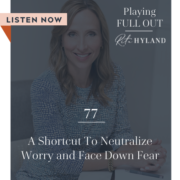
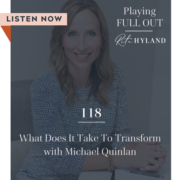
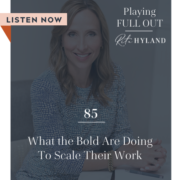
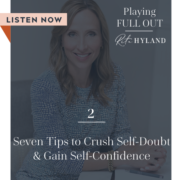
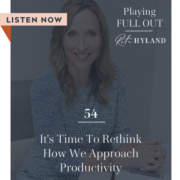
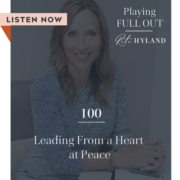


Leave a Reply
Want to join the discussion?Feel free to contribute!